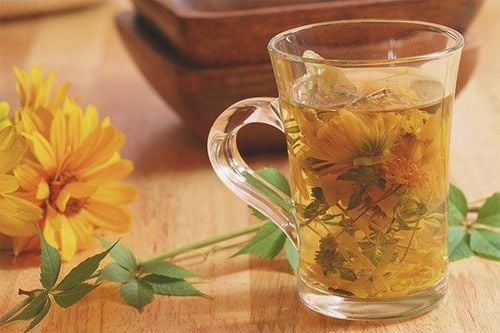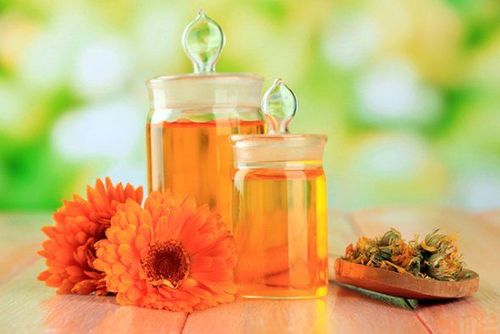Calendula, commonly known as marigold, is a flowering plant used for medicinal purposes and can be prepared as a tea or incorporated into various herbal formulations. The tea is made by steeping the flowers in boiling water, while the extract is derived from both the flowers and leaves.
1. Overview
Calendula flowers are often used to treat wounds, rashes, infections, inflammation, and a variety of other conditions. However, substantial evidence supporting these uses is lacking.
It's important to distinguish calendula from ornamental marigolds of the genus Tagetes, which are frequently cultivated in vegetable gardens. Chemicals in calendula are believed to aid in the growth of new tissue in wounds and reduce swelling in the mouth and throat.
2. Antioxidants
Antioxidants are beneficial compounds that help neutralize the harmful effects of oxidative stress in the body.
Calendula extract contains several robust antioxidants, including triterpenoids, flavonoids, polyphenols, and carotenoids.
It also includes anti-inflammatory compounds, such as tumor necrosis factor-alpha (TNFα). Although inflammation is a normal bodily response, chronic inflammation is linked to various conditions, including obesity, metabolic syndrome, and type 2 diabetes.

2. May Promote Healing Wounds and Skin Ulcers
Calendula extract is commonly found in oils, ointments, and tinctures used topically to treat wounds and ulcers. However, it remains unclear whether drinking calendula tea is effective for this purpose.
In vitro and animal studies have shown that calendula extract can regulate the expression of specific proteins that promote wound healing. One in vitro study has shown that calendula extract increased collagen levels in healing wounds, an essential protein for forming new skin.
In a 12-week study involving 57 participants, 72% of those treated with calendula extract experienced complete healing of venous leg ulcers, compared to only 32% in the control group.
Similarly, a 30-week study with 41 adults suffering from diabetic foot ulcers showed that 78% had complete wound closure after daily treatment with a calendula spray.
3. May Against Certain Cancer Cells
The antioxidants in calendula may provide anti-tumor effects. In vitro studies indicate that flavonoids and triterpene antioxidants in calendula can against leukemia, colon cancer, and pancreatic cancer cells.
Research has found that the extract activates proteins that kill cancer cells while blocking other proteins that could interfere with cell death.
It's crucial to note that calendula tea or other calendula products should not be used as a cancer treatment.
Applying calendula ointment to the skin may help reduce radiation dermatitis in individuals undergoing radiation therapy for breast cancer. Other early research suggests that using calendula cream may not be more effective than petroleum jelly for alleviating radiation dermatitis.
4. May Have Antifungal and Antibacterial Properties
Calendula extract is recognized for its antifungal and antibacterial properties. In one in vitro study, oil derived from calendula flowers effectively inhibited 23 strains of Candida yeast, a common fungus that can lead to infections in the mouth, vagina, and skin.
Preliminary research indicates that using a vaginal cream containing calendula may alleviate burning, odor, and pain in women experiencing bacterial vaginosis.
Additionally, another in vitro study revealed that calendula extract could inhibit the growth of leishmania, the parasite responsible for leishmaniasis—a disease that can cause skin ulcers or affect internal organs such as the spleen, liver, and bone marrow. Calendula oil, ointment, compress, or spray can be applied directly to the skin; however, further human studies are necessary to determine the effectiveness of these treatments.

5. May Support Oral Health
Calendula may assist in managing oral conditions like gingivitis. Gingivitis is one of the most prevalent oral diseases, which is characterized by chronic gum inflammation.
In a six-month study involving 240 individuals with gingivitis, those who used a calendula mouthwash experienced a 46% reduction in gum inflammation compared to a 35% reduction in the control group.
Furthermore, an in vitro study indicated that a calendula-based mouthwash reduced the number of microorganisms on suture material used for tooth extractions. These results are attributed to the potent anti-inflammatory and antibacterial properties of calendula. Gargling with calendula tea is also believed to help relieve sore throats, although this evidence is mostly anecdotal.
6. May Improve Skin Health
Calendula extract is widely utilized in cosmetics, including creams and ointments.
Both in vitro and human studies demonstrate that calendula extract can enhance skin hydration and stimulate firmness and elasticity, potentially delaying signs of aging.
These benefits may stem from its antioxidant properties, which can reduce skin damage caused by oxidative stress.
Since exposure to ultraviolet (UV) light is a significant contributor to oxidative stress in the skin, one in vitro study found that calendula oil has a sun protection factor (SPF) of 8.36.
Therefore, sunscreens formulated with calendula oil may provide some protection against sunburn. Moreover, a 10-day study involving 66 children with diaper rash concluded that calendula ointment could serve as a safe and effective treatment.

7. Other uses
Although many people claim additional benefits of calendula, few are backed by scientific evidence.
May regulate menstrual cycles. Calendula is believed to induce menstruation and relieve menstrual cramps, but supporting research is limited.
May relieve sore nipples during breastfeeding. Calendula products may help treat cracked nipples when applied topically, although more research is needed.
May work as a facial toner. Its antibacterial properties are said to reduce acne and pimples, but there is no evidence supporting this claim.
May promote heart health. The anti-inflammatory and antioxidant properties of calendula might lower the risk of heart attack. However, these effects are based on a single in vitro study using high doses.
May reduce muscle fatigue. A study conducted on rats found that calendula extract alleviated exercise-induced muscle soreness. However, the study also included extracts from two other plants, complicating the ability to determine the isolated effects of calendula.
Calendula may help alleviate pain in individuals with anal fissures that do not respond to treatment with sitz baths and nifedipine.
Using a calendula spray can help prevent infection and reduce odor in individuals with long-term diabetic foot ulcers.
To arrange an appointment, please call HOTLINE or make your reservation directly HERE. You may also download the MyVinmec app to schedule appointments faster and manage your reservations more conveniently.
Articles refer to sources: healthline.com, webmd.com
To arrange an appointment, please call HOTLINE or make your reservation directly HERE. You may also download the MyVinmec app to schedule appointments faster and manage your reservations more conveniently.








